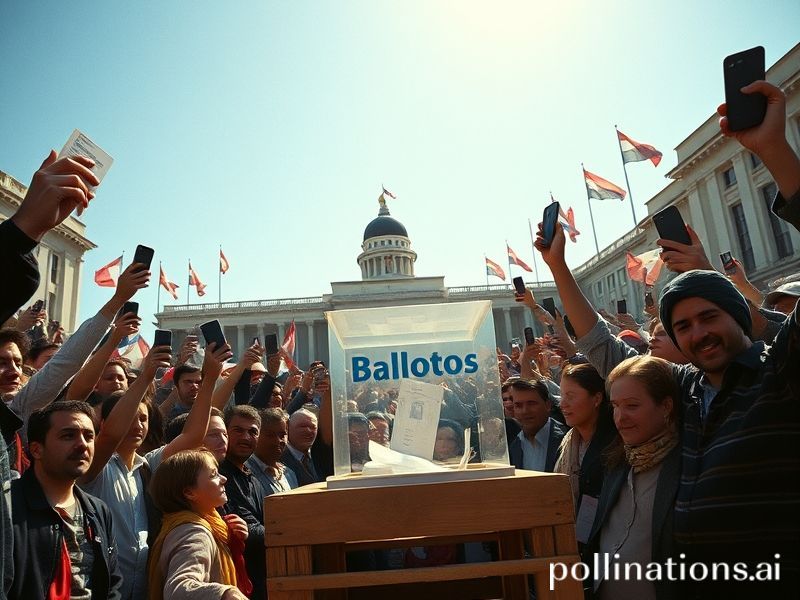Democracy’s Fire Sale: How the World’s Favorite Political Product Became a Bargain-Bin Special
The Global Democracy Sale: Everything Must Go, Terms and Conditions Apply
DATELINE—Somewhere with functioning Wi-Fi and a suspiciously empty ballot box.
Democracy, that plucky Athenian start-up turned planetary franchise, is having a clearance event. From the marble steps of the Acropolis to the fluorescent-lit community centers of Iowa, the brand is being re-imagined, repackaged and—when necessary—repossessed. Step right up, ladies and gentlemen, for a once-in-a-lifetime liquidation of the very idea that once priced tyrants out of the market.
In Delhi, the world’s largest exercise in collective self-delusion—sorry, “elections”—has just concluded. One billion voters, seven phases, forty-four days, and exactly one WhatsApp forward away from believing the other side eats babies for breakfast. Meanwhile, in Moscow, the electorate enjoys a more streamlined experience: one candidate, one day, one very long table separating the president from his nearest “contender.” Efficiency is the hallmark of a well-oiled machine; the oil, in this case, being the tears of poll observers.
Across the Atlantic, the United States continues its quadrennial tradition of turning the electoral college into a reality-TV finale. This season’s twist: a former president running from a courthouse rather than a campaign bus, while his opponent attempts to appear sentient for ninety minutes on live television. Consultants call it “voter engagement.” The rest of us call it a hostage situation with bumper stickers.
Not to be outdone, the European Union—democracy’s retirement home—has discovered a thrilling loophole: if voters pick the “wrong” result, simply keep holding referendums until exhaustion sets in. Ireland, Greece, the Netherlands and others have all enjoyed reruns. It’s democracy’s version of a software update that never quite fixes the bug but always installs new tracking cookies.
In Africa, coups are staging a nostalgic comeback, like vinyl records but with more bloodshed. Niger, Mali, Burkina Faso and Sudan have all recently swapped ballots for bullets, citing “popular support” measured by the number of soldiers on television. Analysts note that the continent’s median age is nineteen, meaning most citizens have seen more changes of government via men with guns than via men with slogans. A marketing opportunity, surely, for bullet-proof polling booths.
Asia, meanwhile, has embraced a hybrid model: elections without consequences. Cambodia’s ruling party swept 120 of 125 parliamentary seats after the main opposition was declared illegal. Singapore holds polls regularly, provided you don’t mind libel suits that make student loans look like pocket money. And in Thailand, voters overwhelmingly chose reform, only to watch the army-appointed senate politely ignore them. It’s democracy with training wheels—except the wheels are made of lead and the instructor keeps the key.
Latin America offers the premium subscription tier: democracy bundled with economic collapse. Argentina just elected a chainsaw-wielding libertarian who promises to dollarize the economy, which is a fancy way of saying “replace inflation with imperialism.” Venezuela, refusing to be outdone, has scheduled elections for 2024 under rules so restrictive the ballot will reportedly feature one name and a mirror so voters can admire their own complicity.
Yet for all the mockery, the global hunger for the democratic myth persists. Hong Kongers wave blank sheets of paper to protest censorship; Iranians risk bullets to dance in the streets; even North Koreans reportedly tune in to foreign radio under blankets, proving that repression has a terrible marketing department. Meanwhile, Silicon Valley sells “digital democracy” in the form of blockchain voting apps nobody asked for, developed by founders who think polling places are pop-up stores.
The cruel joke, of course, is that democracy was never a product to begin with. It’s a perpetual group project where half the team never reads the syllabus, the other half sells the answer key on Etsy, and the professor grades on a curve drawn by lobbyists. Still, the alternative—open dictatorship—lacks even the pretense of consent, and humans do love their polite fictions.
So as another news cycle spins the globe like a rigged roulette wheel, remember: every vote counts, except the ones that don’t, which is most of them. But show up anyway. The concession stand still sells hope at a reasonable markup, and the exit is alarmed.







